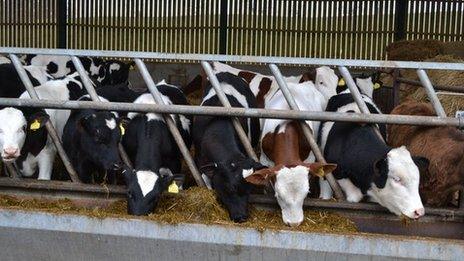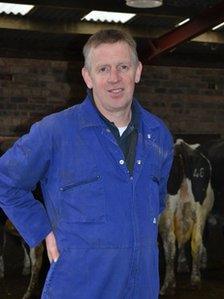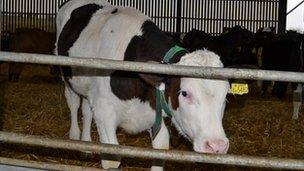Are Scotland's dairy farmers getting a fair deal yet?
- Published

Nether Affleck Farm, near Lanark, is a family run business and has 320 cows
Milk is something that most of us drink or consume in some form. Yet dairy farmers have long complained that they have not always got a fair deal when it comes to price. So what is the reality of life as a Scottish dairy farmer at the moment? This is one farmer's view.
Light filters through wooden-slatted walls into a shed housing bull calves which are now nearing six months old.
Some are munching busily on straw, others are drinking with great gusto.

Jim Baird says he's always wanted to work with animals
This is Nether Affleck Farm, near Lanark. It has 320 cows split between two units. Although it is a dairy farm these calves will be sold for beef. It is a useful sideline.
Outdoor living
"This is the farm I was brought up on and we've another farm nearby," says Jim Baird, the farmer here.
"I enjoy the outdoor life, enjoy working with animals and that was always where I wanted to be."
This has been a family farm. The capital costs involved in setting up a dairy farm mean that it is a difficult business to be able to afford to buy into.
The need for economies of scale have also led to changes, with most farms now specialising in a particular area instead of having a bit of beef or cereal as well.
Mr Baird thinks back to a time last year when dairy farmers staged a series of protests and blockades against declining payments.
"We had a situation where we had two really big price cuts in quick succession," he recalls.
"At a time when farmers were feeling the pinch with the weather and they were feeling the pinch with a lot of costs coming on to their businesses and I think that whole frustration just boiled over."
"Most dairy farmers did take part," he continues, "and there were protests at Lanark near here and there was a huge turnout at these demonstrations."
'Early days'
The end result was an agreement between dairy farmers and processing firms on a voluntary code of practice for future contracts for milk supplies.
Mr Baird says it is "early days" but if the code brings a "bit more transparency and trust to the supply chain that's got to be good".
A muddy walk across the farm yard, tailed by a very dirty but enthusiastic farm dog, brings us to the cubicle shed. At this time of day, mid-morning, it is full of cows eating their fill.
There are about 190 cubicles in all. Each animal has their own cubicle, their own place where they can lie on a foam mattress. The infrastructure in this shed has represented a major investment over the past five years.
The more time the cows can spend lying down, chewing the cud, the more productive they are likely to be.

Farmer Jim Baird says the cost of feeding the cost is currently up by 25-30%
"It's like every other business," says Mr Baird, "some people are able to drive their businesses forwards and other people are struggling."
"I think because of the impact of the weather, because feed costs have gone up by something like 25-30%, at the moment I think, probably across the board, most businesses are feeling the pressure on margins more than they've ever done.
"I hear that there are more businesses really feeling the pinch and now's not a good time to be going to your bank manager to be looking for an extension to your overdraft because they're not as easy to deal with as they once were."
Business first
His daughter has expressed an interest in the farm and has already started working in the business. In general he feels the sector needs to attract more young people.
He may enjoy the life but it has to make business sense.
"My alarm goes at 4 o'clock every morning so you have to be turning a quid at the end of the day.
"The whole supply chain's got to work better.
"At the moment everyone's taking too short term a perspective, the processors, the retailers and the farmers and we need to realise that this industry's got to be there for the long term and everyone's got to be able to get a reasonable share and a reasonable profit out of it and be able to reinvest in their businesses and that's where a lot of farmers are struggling at the moment."
You can hear more about the wider milk industry in Business Scotland on Saturday 9 March at 06:00 and repeated on Sunday 10 March at 10:00. It is also available on BBC iplayer.
- Published8 February 2013
- Published22 November 2012
- Published4 September 2012
- Published3 September 2012
- Published23 July 2012
- Published20 July 2012
- Published14 July 2012
- Published6 July 2012